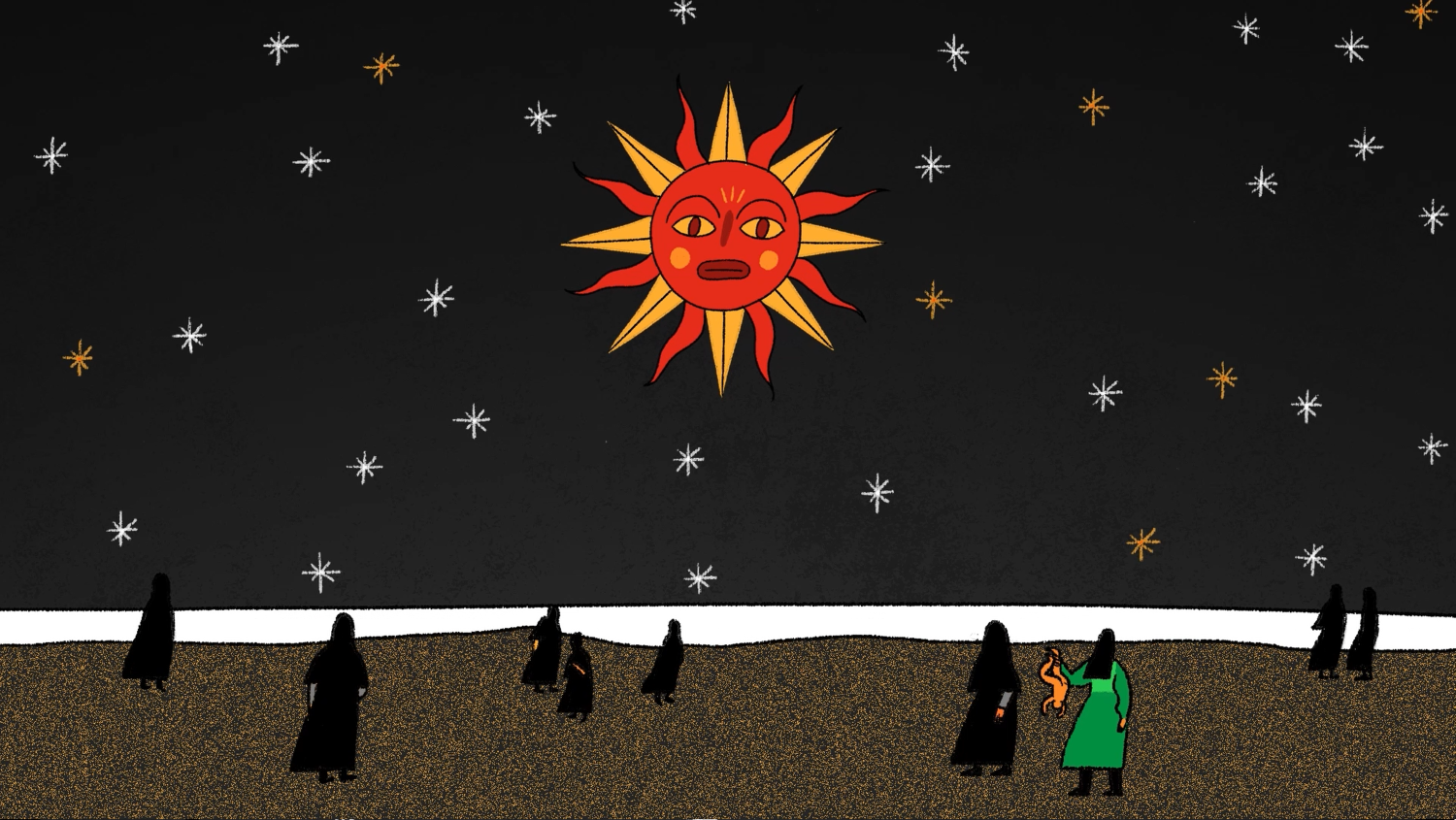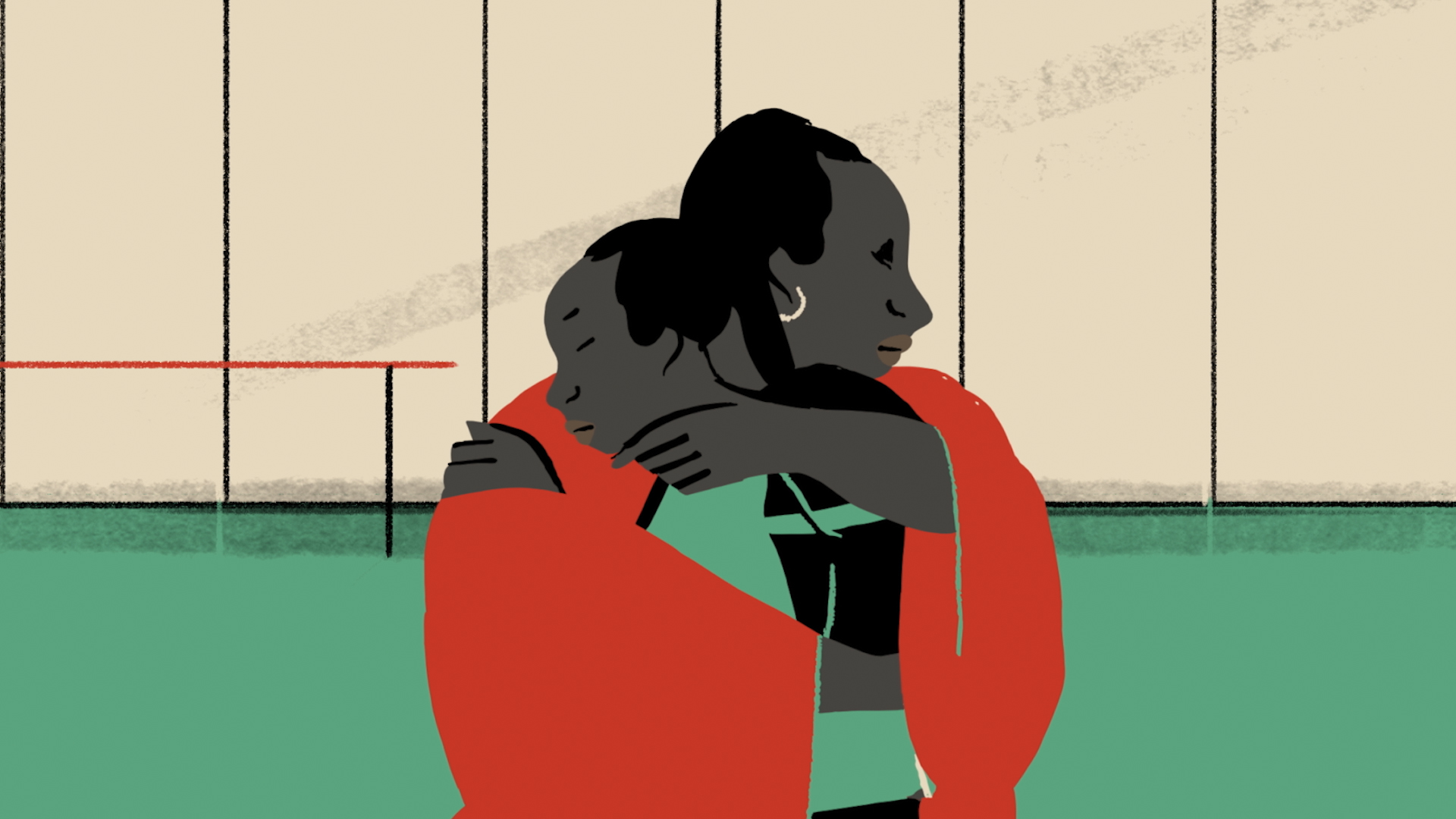“This is much more than a hockey story,” says The Cannons director Steven Hoffner. “It’s more of a human story.”
The Cannons is one of six Canadian films screening at DOC NYC this year as part of the festival’s Voices of Canada series. As the only Canadian world premiere of the bunch, The Cannons should prove to the American audience that there’s much more that unites us than divides us. The doc might be about hockey on the surface with its rousing portrait of the Washington, DC team that gives young Black Americans the opportunity to hit the ice. However, it’s really a compelling portrait of equity, accessibility, and inclusion. Put another way, The Cannons is a timely essay about the right to play.
The Cannons follows the efforts of Coach Neal Henderson as he embarks on another year with the Fort Dupont team. The hockey club, established in 1976, is one of the only predominantly Black hockey teams in America. Hoffner observes the next class of the Cannons as players get ready to graduate. Some teammates hope to continue playing. Other athletes use the strength and confidence they gained on the ice to pursue new career paths.
The Right to Play
Hoffner, speaking with POV ahead of The Cannons’ premiere, says that his road to the doc came through his work with the National Hockey League (NHL). The director explains how he scored a dream job working in the “situation room” of the NHL as a video editor with some of the most powerful people in the league. “Then I transferred to NHL Studios to become a producer and director/shooter,” explains Hoffner. “It was a one-man band type of gig when they launched nhl.com. I was sent out all over North America to tell documentary stories about the game.” This background laid the foundation for the relationship-building and intimate access required for the modest shoot.
Hoffner observes that working with NHL Studios helped expose him to more stories behind Canada’s game. It also brought him into contact with characters and experiences that needed a fuller treatment. “I learned about the Cannons on my own through the Hockey Is for Everyone program,” notes Hoffner, referring to the NHL’s grassroots program to encourage inclusion in the sport. “I was actually introduced to the club through Kevin Weekes, who’s a former NHL goalie and an associate producer on the film.”
The spirit that hockey is for everyone is at the heart of Coach Neal’s philosophy and a driving message of The Cannons. Hoffner offers intimate insight to the team as the young men defy the outdated stereotypes that hockey is a white man’s game. Moreover, the team ensures that the cost of hockey, which can be prohibitively expensive, isn’t a barrier for athletes who want to play.
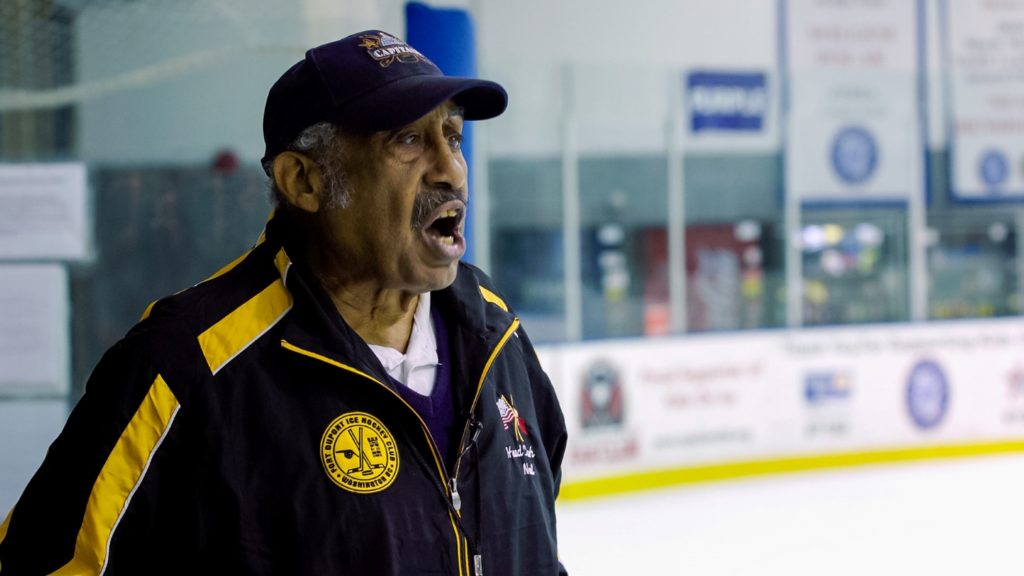
Coach Neal
The film starts with where the Cannons began: with Coach Neal Henderson. Hoffner follows Henderson as he acts like a father figure for the boys on the team. He mentors them and provides guidance while assistant coaches refine their hockey skills and prepare them for games. Neal’s supporters, meanwhile, rally for him to be inducted to the Hockey Hall of Fame for his efforts. The Cannons inevitably invites comparison to the Hot Docs hit Willie, which celebrated Willie O’Ree’s status as the NHL’s first Black player, but pays tribute to all the players behind the scenes who bolster underrepresented talents.
However, the film and the hockey season take a dramatic turn when Coach Neal’s wife faces a decline in her health. The film steps back from Neal as he prioritizes his family. In turn, it finds the larger spirit of community for which he is responsible. “Coach Neal was very private, and rightfully so, with regards to his wife’s privacy,” admits Hoffner. “We had to understand and respect that. We honestly thought that the movie was over: Coach Neal had to bow out and we didn’t even know if they were going to have a game. It was a ‘dark night of the soul’ moment, if you’re a reader of Blake Snyder. We didn’t know where to turn and then, miraculously, there was a game and all these stories unfolded about our characters.”
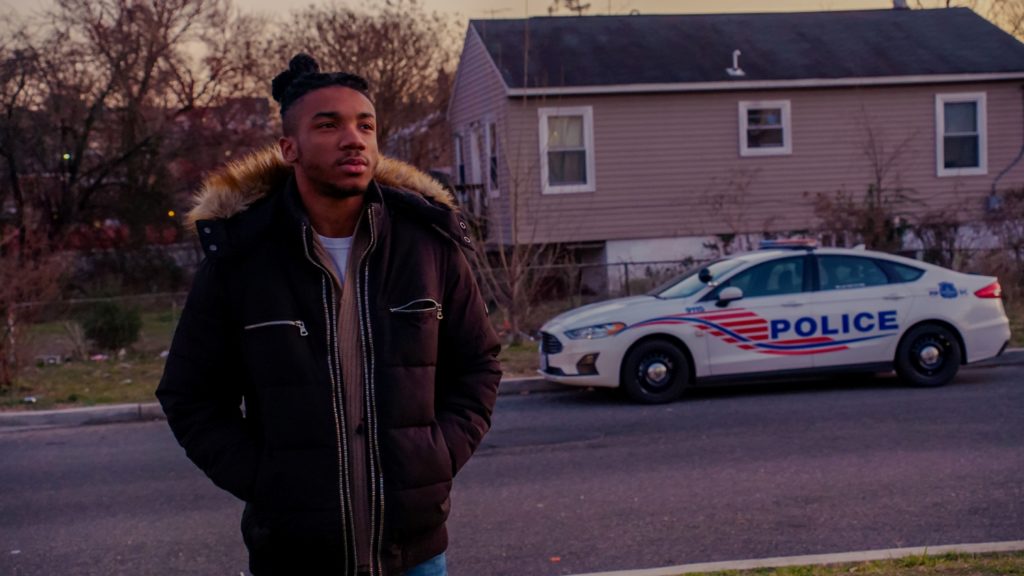
Robert and Rayvon
The Cannons zeroes in on two players, Robert and Rayvon, who embody the team’s spirit. Hoffner says that he was introduced to the players by Cannons co-founder Betty Dean, dubbed the “unsung hero” of the team by the NHL. Hoffner explains that they screened the team to find the right characters for the story, but ultimately honed in on Robert and Rayvon due to their family circumstances, career aspirations, and relationships with their mothers.
“When we talked to the mothers, they became really central. That clinched it for Robert and Rayvon because the family dynamic became very interesting for us,” notes Hoffner. The director says that he initially followed Cannons’ star player, Eric Bennett, and one player’s father who is a Washington police officer. However, he dropped both stories in the intensive editing phase to focus on Robert and Rayvon.
Robert struggles with school but hopes to become a police officer after graduation. Rayvon, alternatively, excels in his studies and is optimistic for college and future hockey stardom. However, Robert’s mother, Carolyn, will do anything to help her son, yet a cancer diagnosis puts their finances in jeopardy. It’s a similar situation in Rayvon’s home. His mother, the optimistically named Tomorrow, can’t work due to health reasons and barely afford the light bill. Both players need to secure scholarships or manage their expectations.
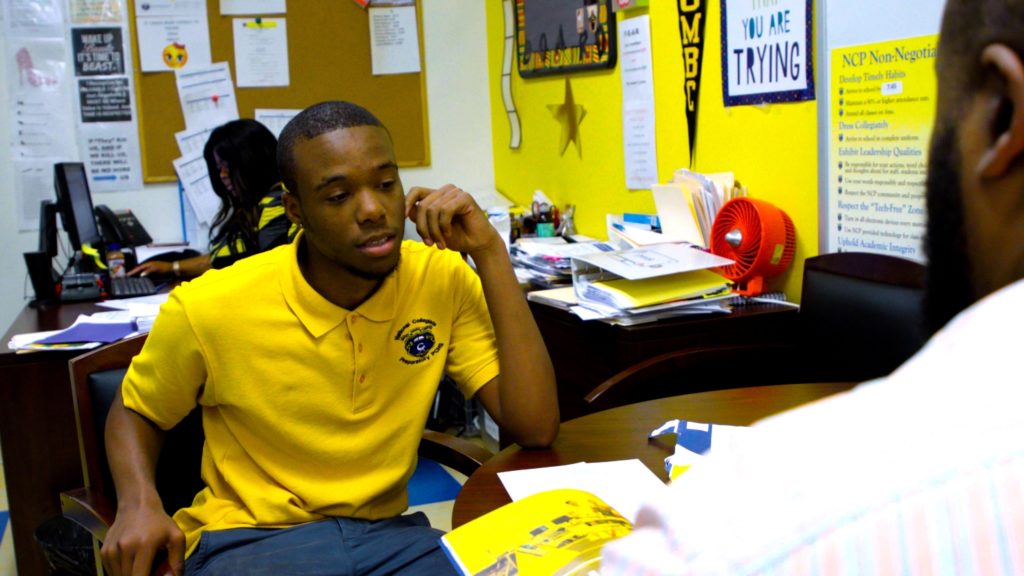
Education and Access
Hoffner says that focusing on older teammates, rather than younger players, helped sharpen the role the team plays in shaping the young men’s futures. “Having senior kids in their final year gave the film higher stakes,” explains Hoffner. “After school and their final year with the Cannons, they’re going on to other things. But they’re not always welcome in those places.” The film observes as Robert and Rayvon assess their prospects with guidance counsellors, talk college application strategies, and have difficult discussions with their parents. Yet the inspiration Coach Neal gives them on the ice grants them the confidence to believe in themselves.
“Rayvon’s mother, Tomorrow, says she put the kids into the Cannons program so the streets don’t take them,” observes Hoffner. “That’s a really powerful statement.” Carolyn matter-of-factly tells Hoffner of the family members she lost to violence on the streets. The escape from gang life is one of the ways in which the league empowers the boys on the ice.
The Cannons observes the role that hockey plays in the boys’ lives not only by capturing the practices and scrimmages, but also by chronicling their daily life off-rink. Hoffner observes as the boys play hockey video games adorned in rooms with posters of Alex Ovechkin. “We’re so focused on white privilege in terms of the people we believe play this game. We think that it doesn’t really happen in other places, and it does,” says Hoffner. “It was interesting to be in an environment where we could really flesh that out. We’re showing the kids being part of their African American culture, but also embracing hockey culture, which some people think is not for them, but it, really, it is. That was part of us breaking those types of barriers and stereotypes.”
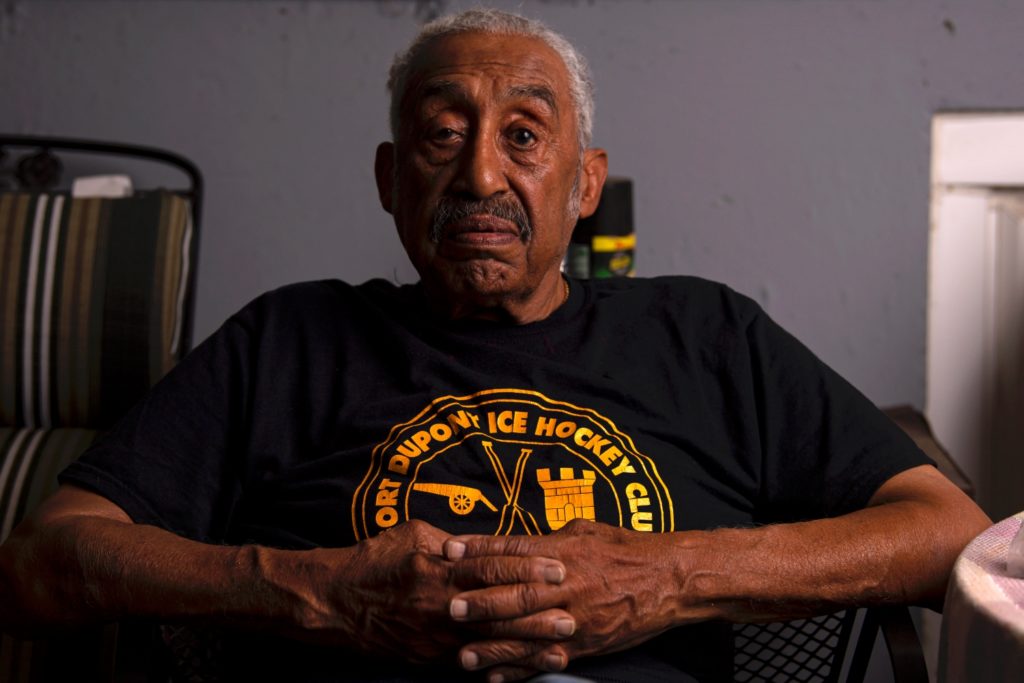
Perspective and Trust
This depiction inevitably leads to the question of why a white filmmaker might tell the story of a Black hockey team. Hoffner, who was born in the diverse Toronto suburb of Scarborough, acknowledges the optics and admits that he can’t be divorced from the challenges of documenting experiences that aren’t his own. However, he notes that a mix of circumstances and strong belief in the project kept him in the director’s seat. “We were a point where no one else was telling this story. We had a circumstance where financing fell out,” explains Hoffner. “It was on us to tell this story. They were appreciative that we were taking our own money and our own time.”
Despite not getting financial support from any of the major Canadian funders—who, presumably, would believe in the power of an inclusive hockey story—Hoffner explains that he largely self-financed The Cannons through his company 383 Pictures, and used some cash leftover from a condo sale in a recent divorce. The small team, which mostly consisted of Hoffner shooting solo outside the major game, gave intimate access to the players and Coach Neal. Modesty let him build their trust in ways that a larger, busier production might not.
Hoffner also credits Toronto filmmaker Charles Officer for giving him advice to understand the perspective with which he approached the story. “Charles said to me ‘You’re a white guy—why do you deserve to tell this story? Why are you part of this?’ You have to know those questions to get to know your characters,” observes Hoffner. He adds that Officer’s advice that immersing oneself in the lives of one’s characters, like he did with Unarmed Verses, lets a filmmaker truly understand their experiences before committing them to film.
Fostering Dialogue
“You have to do the research,” explains Hoffner. “My co-director AJ Messier sent me articles about white flight, blockbusting, and mortgage discrimination in that area. I had no idea what any of those things were, so we started researching to understand context. Once you educate yourself, you can start having a proper dialogue with the people you hope to be filming.”
The Cannons shows ample evidence of that trust as Robert, Rayvon, Coach Neal, and their families open their lives with intimate and vulnerable moments. The film inspires audiences to look beyond stereotypes and prejudices. Hoffner hopes viewers learn from Coach Neal’s mission to bring out the best in his community. “I was loosely inspired by what the Willie O’Ree documentary did by pushing towards an educational faction. This film is about much more than just sports,” notes Hoffner. “Coach Neal’s message of empathy and love for humanity is what we’re most excited to share that with the world. That really was the driving force behind this movie.”








